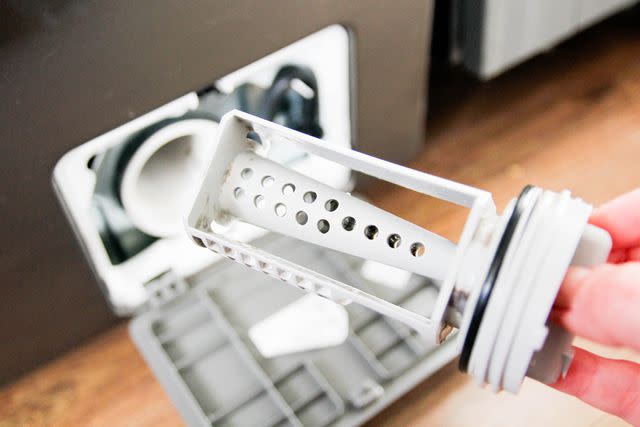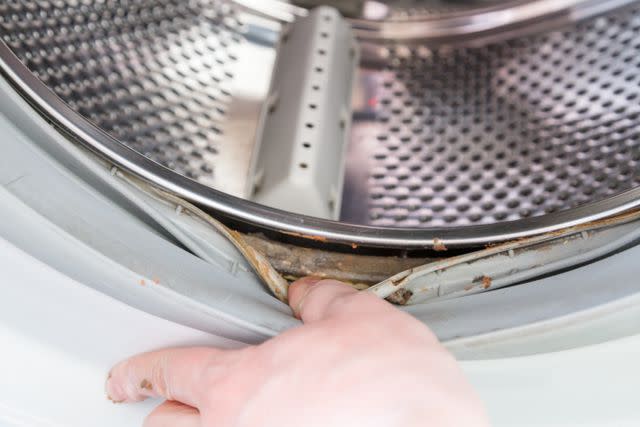Why Does My Washing Machine Smell? 6 Causes and How to Fix It

LaylaBird / Getty Images
If your washing machine smells as though something has died in it, you’re not alone. Having a smelly washing machine is a very common problem—but even more so with front-load models.
Below, we’ll walk you through six common smell sources, as well as potential fixes and easy cleaning hacks that help keep unpleasant odors at bay. Spoiler: the washing machine is actually a gold mine for bacteria.
6 Causes of Washing Machine Smell
Trapped Water
Hear water sloshing around whenever you spin your washing machine drum? Fret not, it’s completely normal for washing machines to have a little water under the drum. Technically, this water solution is sealed on purpose to maintain balance when the drum spins (aka the balance ring).
The problem is when you can see water trapped inside the drum. This stagnant water causes moisture levels to go up. And that’s usually when mold rolls out its welcome mat and a musty smell kicks in.

Kinga Krzeminska / Getty Images
A Dirty Filter
Most people don’t clean their washing machine filters as often as they should. Yet, the filter accumulates everything from dirt to fluff to foreign objects like coins and hairpins—and sometimes adventurous Lego pieces.
Sure, the debris isn’t visible, but it will build up over time and turn into a disgusting sludge. Not only does it stink, but an overly dirty filter can also affect the machine’s efficiency—resulting in poorly washed clothes and, worst-case scenario, long-term damage.
Clogged Drain
On a similar note, dirt, and debris can accumulate in your washer’s drain parts. Bacteria will multiply and emit a sewage-like stench, known as hydrogen sulfide gas. The only thing is: the gas will have nowhere to go but flow backward into your washing machine because of the clog.
Aside from the nauseating smell, the signs of a clogged drain are pretty obvious, such as standing water in the drum, slow drainage, and loud gurgling sounds.
It may well just be that the drain hose is kinked (which can easily be smoothed out or replaced) or that the pipe needs clearing. Other times, the clog may be in the main sewer line—e.g. water comes up through the kitchen sink when the washing machine drains. In this case, call a plumber ASAP.
Dirty Washing Machine
A washing machine’s job is to clean clothes, not itself—of course, unless your appliance features a self-clean cycle. So it will smell bad if not cleaned periodically.
Think about it: your washing machine is constantly bombarded with all things sweaty and dirty. All that dirt gets flushed away with the rinsing water, right? Unfortunately, no.
Body oils, clothing fibers, soap remnants, and hard-water deposits often prefer to linger in the crevices of the washtub. Together, they create a filmy residue that not only gives off a strong, sour smell but may also be the reason why your laundry is coming out worse than when it went in.

z1b / Getty Images
Something Stuck in the Door Seal
Ever wonder where your missing sock disappeared to? It turns out that the rubber ring around a front-loader’s door is a secret hang-out spot for small clothing items.
The yucky part is that water tends to pool in the door seal, so the trapped garment will stay sopping wet. Left unattended, the smell will get horrendous—because there’s nothing odor-causing germs love more than a moist environment.
Note that gunk can also accumulate in the bottom of the door seal and clog the drainage holes there, which is yet another stink risk.
Rotting Detergent
It might sound counterintuitive, but your nice-smelling laundry detergent could be the culprit behind your foul-smelling washing machine.
The more detergent you use, the more lather it creates; and thus the harder it is to rinse out. The leftover soap then settles in parts of the washer, giving mold and other bacteria a nice food source as it deteriorates.
But that’s not all—detergent residue can build up in the detergent drawer and seal in moisture when closed. With time, this can lead to a funky smell.
How to Fix Washing Machine Smell
The good news is that, in many cases, the cure just involves a deep clean. However, obvious signs like pooling water and slow draining need to be fixed first before dealing with the pesky smell.
Clean the Drainage Department
Disconnect the drain hose (the corrugated tube behind the unit). Check for kinks and blockages—use a drain snake, drain cleaning brush, or stiff wire to remove any debris and buildup. Next, give the inside of the hose a good clean by running hot water through it. Bonus points if you use a vinegar and water solution and let it soak to get rid of lingering odors. If the hose still smells bad after cleaning, you’re better off replacing it.
Locate the drain pump filter (usually placed at the bottom corner for front-loaders and inside the agitator for top-loaders). Remove the filter and clean well with soap and water, getting into every nook and cranny with a toothbrush. Once clean, insert the filter back in its place. One point to remember, not all washing machines have an accessible filter. We recommend you check your user manual to determine if it has a filter and how to access it.
Tip
For safety reasons, always unplug your washing machine before tinkering with it. Also, have a towel and a bowl/bucket at hand to catch excess water that might come out.
Tackle the Other Smelly Parts of Your Washer
Wash the detergent tray in hot, soapy water (or a warm vinegar solution). If your detergent box isn’t removable, use a toothbrush or bottle brush to scrub it, followed by a damp cloth to wipe down the surfaces.
Scrub the inside of the rubber door seal, making sure to clean out the little drain holes with a Q-tip, toothpick, or fine-pointed tweezers. A soft bristle brush and ¼ cup of chlorine bleach mixed in two cups of water can help remove existing mold. Finish off by rinsing the area with hot water and drying it with a clean cloth.
Wipe the drum with a non-abrasive cleaner to remove any visible residue that your dirty clothes have left behind. Then run an empty cycle on the hottest setting to cleanse the drum. You can also add bleach to the cleaning cycle, which is effective at deodorizing. Run a final rinse cycle to flush away any remaining cleaning solution.
Simple Habits to Prevent Washing Machine Smells
Deep clean your washing machine monthly. This includes wiping exterior surfaces, scrubbing the door seal, and running a hot, extra-long cycle (or a self-clean cycle if your washer has this function).
Wipe the drum and door gasket with a dry cloth after each wash cycle. If you can’t be bothered, an even easier alternative is to leave the door open or ajar so trapped water can evaporate. Keep in mind that it takes a while (about 24-48 hours) for washing machines to fully dry after a cycle.
Don’t forget to check and clean your washing machine filter every couple of months—or more frequently if you have shedding pets.
Rinse the detergent drawer and leave it open to air dry after every load.
Read Next: How to Clean Your Washing Machine Without the Hassle
Read the original article on The Spruce.

